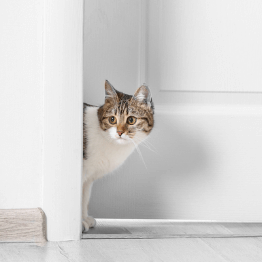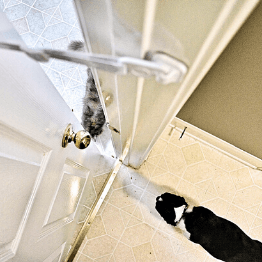TOXOPLASMOSIS IN CATS - ALL YOU NEED TO KNOW
By: Door Buddy Editors | Published: 29 February, 2024
When it comes to toxoplasmosis in cats, you may immediately have some concerns. What are the symptoms of toxoplasmosis? Are my toxoplasmosis pregnancy fears legitimate? Is toxoplasmosis in dogs real? And, how do I prevent toxoplasmosis?
Before we get all paws up in worry, Door Buddy is here to help. Here is everything you need to know about toxoplasmosis and how you can protect yourself and your “fur-mily”.
WHAT IS TOXOPLASMOSIS?
Toxoplasmosis is a disease caused by a tiny parasite called Toxoplasma gondii which cats are one of the more common hosts of.
People can catch toxoplasmosis by eating undercooked contaminated meat, by touching or coming into contact with infected cat poop (feces). For your cat, they can come into contact with this parasite by eating raw meat on their frequent hunting trips.
“Fur-tunately”, in most cases, the symptoms are mild and even non-existent. The biggest issue is it getting transmitted to the litter box and infecting the rest of your “fur-mily”.
An essential point to note is that if your kitty contacts toxoplasmosis, they will probably remain infected for life. Thankfully, in most cases it will remain dormant and won’t interfere with your cat’s immune response.
TOXOPLASMOSIS SYMPTOMS
Parasite infections don’t sound fun. The good news is that if you’re healthy and not pregnant, then you shouldn’t have too much to worry about when it comes to your health.
Toxoplasmosis Symptoms for Cats:
-
Fever
-
Weight loss
-
Lethargy
-
Loss of appetite
-
Jaundice
-
Inflammation of the eye
-
Tremors or seizures
-
Muscle pain
It’s vital to recognize the toxoplasmosis symptoms and seek the right treatment as soon as you can.
Regardless of if your cat has a toxoplasmosis infection or not, you shouldn’t ignore the symptoms. If they’re exhibiting any of the above symptoms, take your furry friend to the vet. Stat!

Toxoplasmosis Symptoms in Humans:
Most healthy people won’t experience toxoplasmosis symptoms, but those who do say it is very similar to flu.
Here’s what you need to look out for:
-
Body aches
-
Swollen lymph nodes
-
Headache
-
Fever
-
Fatigue
TOXOPLASMOSIS IN DOGS
Yes, toxoplasmosis is generally associated with cats, however, dogs can get it too! This is why we’re always going on about how to keep the dog out of the litter box. The problem is that because our kitty cats are primary carriers for the parasite, when our doggies go nosing into the litter box, they can easily inhale or ingest contaminated soil.
Other causes of toxoplasmosis in dogs include:
-
Ingesting contaminated meat that’s raw
-
Drinking water with the parasite in it
-
Ingesting infected soil
Toxoplasmosis Symptoms in Dogs:
-
Fever
-
Weight loss
-
Lethargy
-
Loss of appetite
-
Jaundice
-
Inflammation of the eye
-
Tremors or seizures
-
Muscle pain
The symptoms of toxoplasmosis in dogs are similar to cats. If you spot any of the following symptoms, make sure to take your pooch to the vet.
TOXOPLASMOSIS AND PREGNANCY
First and foremost, we should mention that the following information about toxoplasmosis in pregnancy doesn’t take the place of medical expertise. If you’re worried about toxoplasmosis during your pregnancy or have any toxoplasmosis baby concerns, we recommend discussing them with your primary healthcare provider.
Generally, if you were infected before becoming pregnant, your baby is protected by your immunity. Some experts suggest waiting for 6 months after a recent infection before trying to become pregnant.
The good news is that the chances of getting toxoplasmosis for the first time during pregnancy are thought to be very small. Even if you do become infected for the first time during pregnancy, there is only a 10-15% chance of it affecting your baby, in most cases the infection doesn’t spread to your baby.
If the infection does spread to your baby, most infants do not have any symptoms at birth but can develop serious symptoms, such as blindness or mental disability, later in life.
The infection isn’t just a concern for pregnancy. If you’re breastfeeding, you will need to take toxoplasmosis baby precautions as they can be affected through your milk as well.

If you are concerned you can ask your midwife or doctor for a blood test to confirm an infection. If a recent infection is detected you will need to have the amniotic fluid tested and your OB/GYN may even do an ultrasound to see if your baby is experiencing any problems and to decide on the best way forward.
TOXOPLASMOSIS - IS YOUR CHILD AT RISK?
Now that your baby is finally here and will soon start crawling and walking and exploring the house, you may be wondering about the risks of toxoplasmosis in cats to your child?
According to the Center for Disease Control, your child may become infected and not show any symptoms because their healthy immune system keeps the parasite from causing illness.
However, others may exhibit "flu-like" symptoms like fever and sore throat including swollen lymph glands, headaches, and muscle aches and pains that can last for several months.
Severe toxoplasmosis infections which are more likely to occur in children with weak immune systems and can systems can lead to damage to the brain, eyes, or other organs.
PREVENTING TOXOPLASMOSIS

-
Always cook your meat until it’s no longer pink. You can use a food thermometer to ensure it’s cooked properly.
-
Always wash all of your used cutting boards, dishes, counters, and utensils with hot soapy water after any contact with raw meat, seafood, or unwashed fruits or vegetables.
-
Always wash your hands carefully after touching raw meat, fruit, vegetables, and soil.
-
Always wash your fruits and vegetables. For extra precautions, peeling fruits and vegetables also helps to reduce the chance of exposure.
-
Never touch cat tootsie rolls directly; wear gloves if changing cat litter and immediately get those hands clean. If you’re pregnant, stay clear of the litter box altogether!
-
Never feed cats raw meat.
Whether you’re pregnant or just trying to keep your “fur-mily” healthy, there are several things that you can do to prevent toxoplasmosis. Many of these solutions are simple lifestyle changes that we should be practicing for good hygiene.
It is also important to note that if your cat is always kept indoors and never fed raw or under-cooked meat the chances of getting infected are very slim.
How to keep your child safe from toxoplasmosis:
-
Prevent your child from gaining access to the litter box by making use of the Door Buddy Cat Door Latch or Strap
-
Change the cat litter frequently
-
Always wash your hands after cleaning out the litter box and before you touch your child
-
Keep your cat indoors at all times if possible
-
Do not feed your cats raw or undercooked meats
-
Keep outdoor child sandboxes and play areas covered

Long before your baby starts crawling or your toddler starts exploring you need to think about the location of the cat litter box and how you will prevent access.
If you’re struggling with keeping the dog out of the litter box or keeping the baby out of the cat litter box to keep them from getting into the cat’s buried treasure, you may be at a loss. What do you do? Do you close the door whenever your cat isn’t using the litter box? This may work, but it’s no secret that cats hate closed doors.
One option is to use a baby gate to block access to the room with the litter box. However, gates can be cumbersome and inconvenient when it comes to isolating a room that requires frequent access like a laundry room.
When it comes to keeping your little ones out of the room with the litter box, Door Buddy is the easy and convenient solution.
The Door Buddy door latch will keep the door open wide enough so cats can wander in and out, but narrow enough so babies and toddlers cannot enter.
WHAT TO DO IF YOU SUSPECT A TOXOPLASMOSIS INFECTION?
Call your doctor if you or your child is experiencing symptoms of toxoplasmosis, especially if your child has a weak immune system. Your doctor can do a blood test that will detect the antibodies to the parasite and can advise you on a proper treatment plan.
CONCLUSION: TOXOPLASMOSIS IN CATS
So, there you have it - everything you need to know about toxoplasmosis in cats. Again, if you notice any toxoplasmosis symptoms, you should take your pet to the vet or book an appointment with your doctor.
Even though Toxoplasmosis in cats is a real and scary disease, the infection rarely causes problems in healthy babies, toddlers, or children.
“Fur-tunately”, by taking just a few precautionary measures, you can greatly minimize the risks and therefore allow your child to enjoy the companionship and friendship that your favorite feline provides.
Read more about how to introduce cats and babies to achieve a “purrrfect” relationship.





